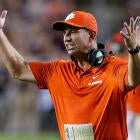The unintended consequence of transfer reform is now real for FBS teams across the nation.
Two senior starters left Power Five programs this week for the most basic of reasons. Oklahoma State receiver Jalen McCleskey and Clemson quarterback Kelly Bryant both departed because they weren't getting enough playing time. And there may be more before Saturday. Who knows?
McCleskey and Bryant, among a number of others (most of which are not seniors), left because they can. New transfer rules allow players to appear in up to four games before transferring and still retain that year of eligibility.
It's time to admit that Week 5 now has become a sort of annual Independence Day -- at least for upperclassmen. Armed with a degree or impending graduation, they can become those free agents coaches feared.
"Do I have to change the way I coach?" Nick Saban wondered aloud when discussing the rule change at the SEC spring meetings.
Well, yes, that's one consideration. There have been a handful of players making the move this year, but how many will there be in 2019 as the full impact of the legislation settles in?
"It's been a surprise to be honest," Vanderbilt coach Derek Mason said Wednesday. "I think it probably is an unintended consequence of what you see in the rule. But you know what? At the end of the day, the rule was old and outdated. What we're doing now is giving young people [another chance]."
The situation isn't affecting Saban or Mason at the moment, but it could. It could affect a load of programs once players grasp that entirety of transfer reform. And you'd better believe coaches all over noticed this week: They just might have to change the way they coach to relate to the modern athlete.
"It's a little bit of a slippery slope when players start to decide whether they're going to play or not," Saban said. "I'm not saying there aren't some circumstances out there where it's not beneficial to the player to save a year, [but] those things should probably be mutually agreed upon."
"When is it insubordination when a player doesn't do what he is supposed to do to be part of a team?" Saban added later on the SEC coaches weekly teleconference.
Or does insubordination even exist if the person in question is the team's best player? Bryant didn't stick around at Clemson to answer that question. He has the talent and leverage to go elsewhere and chase a championship.
Should he be blamed?
"Transferring is becoming very popular now," Oklahoma State coach Mike Gundy told reporters. "What would keep a young man from doing that all across the country at any given time?
"But if they come to you and say, 'Hey, I'm not getting the ball enough. I feel like I need to be somewhere that allows that to happen,' then you have to give him that opportunity. I mean, I don't have any right to keep him here. So why would I anyway? He could just walk off. The ball is in his court."
At its core, the new transfer legislation was meant for increase player freedom. No longer can coaches block players from their desired transfer destination. That insidious, unfair and possibly illegal practice had been allowed since at least 1964. It was absolutely right that it was altered.
In a way, the coaches have only themselves to blame. Earlier this year, Alabama was blocking a backup center from transferring to The Citadel. Kansas State coach Bill Snyder once blocked a disgruntled player from transferring to more than a quarter of the FBS.
But beyond the elimination of blocking, everything else was a virtual unknown. The four-game limit was couched as a way to benefit teams with late-season injuries. That is, perhaps replace an injured veteran quarterback with a talented freshman without consequence. Or it could be used to save up those four games for the end of the season to get underclassmen experience.
Now, at least senior players can play in up to four games and leave without consequence if they graduate.
Some coaches freaked when the likes of Leonard Fournette and Christian McCaffrey skipped bowl games to protect their bodies before the draft. You can imagine the outcry in staff meeting rooms across the country now that players are walking out in the middle of the season?
"I think we have a responsibility and an obligation [to] support the players personally, athletically and academically," Saban said. "And then they have an obligation to play."
It isn't that simple. Alabama QB Jalen Hurts stayed when every logical conclusion had him transferring. That qualifies this week as one of Saban's most brilliant coaching maneuvers.
Bryant chose to leave four games into his senior year, apparently upset at losing his starting job. Hey, who wouldn't be angry if a young upstart -- in this case, freshman Trevor Lawrence -- took your gig? It happens in the corporate world. It happens in football. Kelly likely has a starting job awaiting him somewhere in 2019 at another power.
Meanwhile, Clemson is one Lawrence twisted knee away from being down to freshmen Chase Bice or Ben Batson. The Tigers went from having some of the deepest quarterback depth to staring out over an abyss if Lawrence is injured.
Given the possibility for a Alabama-Clemson rubber match in the College Football Playoff, the two independent situations at those schools could have a significant impact on the national championship.
Somehow, it seems like Alabama won again this week without snapping the ball.
"I just feel like I've been given a fair shot," said Kelly, a veteran of 18 starts.
Meanwhile, Hurts, a veteran of 28 career starts, has accepted his role as backup to sophomore sensation Tua Tagovailoa.
Any language about playing time or transfer options, you won't read in the National Letter of Intent.
But comments similar to Kelly's above you'll be hearing more and more of each season, beginning in Week 5.
















